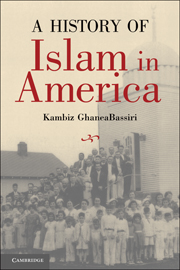Book contents
- Frontmatter
- Contents
- List of Illustrations
- Acknowledgments
- Introduction
- 1 Islam in the “New World”
- 2 Islamic Beliefs and Practice in Colonial and Antebellum America
- 3 Conflating Race, Religion, and Progress
- 4 Race, Ethnicity, Religion, and Citizenship
- 5 Rooting Islam in America
- 6 Islam and American Civil Religion in the Aftermath of World War II
- 7 A New Religious America and a Post-Colonial Muslim World
- 8 Between Experience and Politics
- Epilogue
- Select Bibliography
- Index
2 - Islamic Beliefs and Practice in Colonial and Antebellum America
Published online by Cambridge University Press: 05 August 2012
- Frontmatter
- Contents
- List of Illustrations
- Acknowledgments
- Introduction
- 1 Islam in the “New World”
- 2 Islamic Beliefs and Practice in Colonial and Antebellum America
- 3 Conflating Race, Religion, and Progress
- 4 Race, Ethnicity, Religion, and Citizenship
- 5 Rooting Islam in America
- 6 Islam and American Civil Religion in the Aftermath of World War II
- 7 A New Religious America and a Post-Colonial Muslim World
- 8 Between Experience and Politics
- Epilogue
- Select Bibliography
- Index
Summary
The preceding chapter contextualized the early history of Islam in America within the rivalries and encounters of the Atlantic world that formed the American Republic. It demonstrated how the perceived liminality of African Muslims provided avenues for European Americans to advance their commercial and missionary interests and to re-evaluate the morality of a “civilized” Christian country that permitted slavery. In doing so, it placed the early history of Muslims in America within larger narratives of the rise of mercantile capitalism, the military and economic ascendancy of Western European states, and the formation of an American national identity. The present chapter covers the same historical period but examines another side of the early history of Islam in America. It tells the story of the role Islam played in the lives of African Muslims in colonial and antebellum America. The following chapter shifts focus from the passive, liminal role Muslims played in reaction to forces external to them. This was a moment for them to re-evaluate and reconfigure Islamic beliefs and practices in an American idiom to form new communal relations and to make sense of their historical context.
As the reader has already gathered, the limitations and paucity of the available sources and the fledgling state of historical scholarship on Islam in America restricts any account of the role of Islamic beliefs and practices in colonial and antebellum America to the tentative rather than the conclusive.
- Type
- Chapter
- Information
- A History of Islam in AmericaFrom the New World to the New World Order, pp. 59 - 94Publisher: Cambridge University PressPrint publication year: 2010



